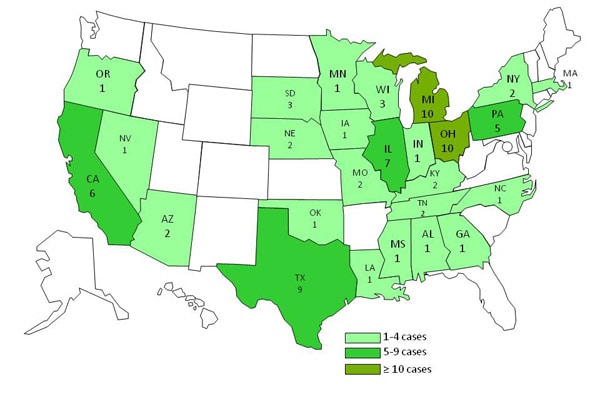
Persons infected with the outbreak strain of Salmonella Heidelberg, by state as of August 1, 2011*
CDC, several states, and the U.S. Department of Agriculture’s Animal and Plant Health Inspection Service (USDA-APHIS) investigated a multistate outbreak of multidrug-resistant Salmonella Heidelberg infections. Epidemiologic and laboratory evidence indicated that contact with dairy calves and other cattle was the likely source of this outbreak. In total, 56 people from 15 states were infected with 17 hospitalizations and, fortunately, no deaths. About a third of the cases were children younger than 5 years old. Illnesses started on dates ranging from January 27, 2015 to November 25, 2017. Of those with available information:
- 35% of people were hospitalized. No deaths were reported.
- 35% of people in this outbreak are children younger than 5 years.
Follow-up investigation on the affected case farms showed that all of the farms had purchased cattle from outside sources. A USDA Info Sheet on Salmonella Heidelberg in dairy calves notes that calves acquired from dealers, sale barns, auctions or markets are more likely to succumb to Salmonella Heidelberg, due to transport stress and exposure to other animals that may be shedding the organism.
Follow these steps to prevent illness when working with any livestock:
- Always wash your hands thoroughly with soap and water right after touching livestock, equipment, or anything in the area where animals live and roam. Use dedicated clothes, shoes, and work gloves when working with livestock. Keep and store these items outside of your home.
- It is especially important to follow these steps if there are children younger than 5 years in your household. Young children are more likely to get a Salmonella infection because their immune systems are still developing.
- Work with your veterinarian to keep your animals healthy and prevent diseases.
It is important to remember that cattle can carry Salmonella and not appear sick. However, in this outbreak, some people did notice illness in their cattle, especially among calves. Livestock handlers should watch for sicknesses in dairy calves and consult their veterinarian if needed.











